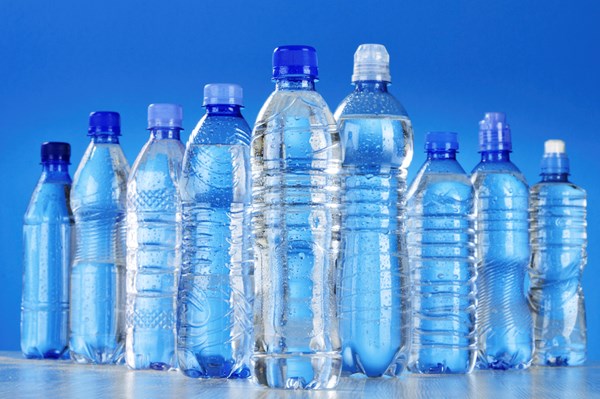Three-Partner Alliance Eyes All-Biobased PET Bottle
Danone and Nestle Waters launch NaturALL Bottle Alliance with California Startup.

Teaming up to accelerate commercial-scale development of 100% biobased PET bottles made from sustainable and renewable resources are the world’s two largest bottled water companies and a California-based startup.
France’s Danone (U.S. office in White Plains, N.Y) and Nestle Waters (Stamford, CT) have joined forces with Origin Materials of Sacramento in this project which will use biomass feedstocks—initially including cardboard, sawdust, and wood chips, but eventually exploring rice hulls, straw and agricultural residue. The goal: not diverting resources or land from food production for human or animal consumption.
For several years, both companies have been committed to sustainable business practices, notably by continuously improving their environmental performance and promoting the development of a circular economy. A big part of this activity has been targeted to the development of innovative packaging that is recyclable and made with renewable resources, along with promotion of recycling. Once they identified the unique approach of Origin Materials separately, the two companies decided to team up to accelerate this promising technology.
The technology is said to represent a scientific breakthrough for this market sector. Moreover, the new NaturALL Bottle Alliance has plans to make it available to the entire food and beverage industry. Frederic Jouin, Danone’s head of R&D for plastics materials:
“Our goal is to establish a circular economy for packaging by sourcing sustainable materials and creating a second life for all plastics…We believe it is possible to replace traditional fossil materials with bio-based packaging materials. By teaming up and bringing together our complementary expertise and resources, the Alliance can move faster in developing 100% renewable and recyclable PET plastic at commercial scale.”
Danone and Nestle-Waters are providing expertise and teams, as well as financial support, to help Origin Materials make this technology widely available and in record time. Said Klaus Hartwig, Nestle’s head of R&D:
“It’s incredible to think that in the future the industry will be able to use a renewably sourced packaging material, which does not compete with food production and contributes to a better plane. It therefore makes perfect sense for us to join forces through this Alliance to develop this innovative technology in a large scale and in the shortest time period possible.”
Here’s the scoop on the strides already made by Origin Materials:
- The company has produced samples of 80% biobased PET in its pilot plant in Sacramento.
- Construction of a “pioneer plant” will begin within this year.
- Production of the first samples of 60+% biobased PET will start in 2018.
- The initial volume goal for the first step is to bring 5000 mt (11-million lbs) of biobased PET to the market.
Due to their complementary skills and shared vision, the Alliance aims to develop the process for producing at least 75% biobased PET plastic bottles at commercial scale as early as in 2020, scaling up to 95% in 2022. The partners will continue to conduct research to increase the biobased content level to their objective of 100%.
Related Content
-
Back to Basics on Mold Venting (Part 2: Shape, Dimensions, Details)
Here’s how to get the most out of your stationary mold vents.
-
Process Monitoring or Production Monitoring—Why Not Both?
Molders looking to both monitor an injection molding process effectively and manage production can definitely do both with tools available today, but the question is how best to tackle these twin challenges.
-
What to Look for in High-Speed Automation for Pipette Production
Automation is a must-have for molders of pipettes. Make sure your supplier provides assurances of throughput and output, manpower utilization, floor space consumption and payback period.
















